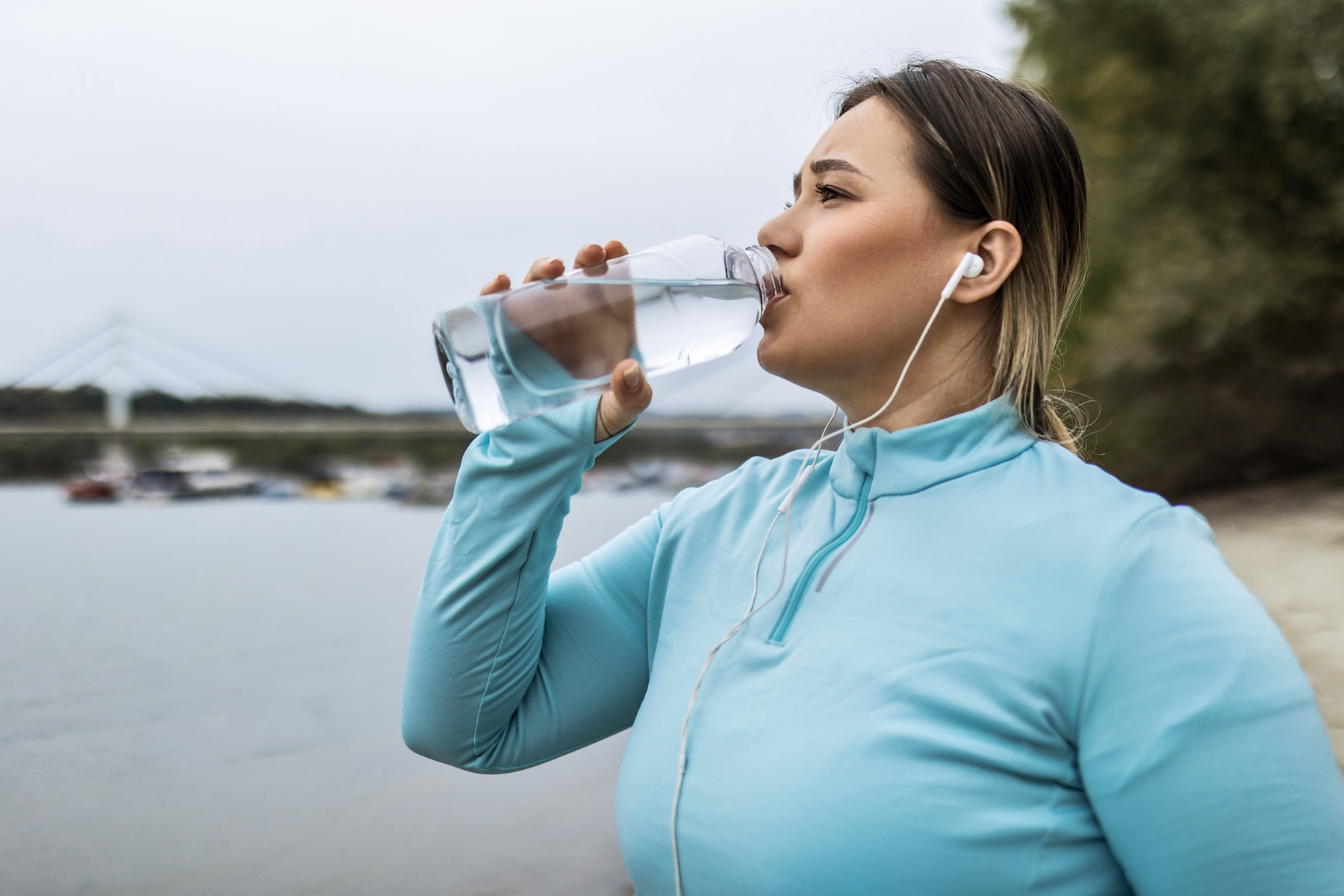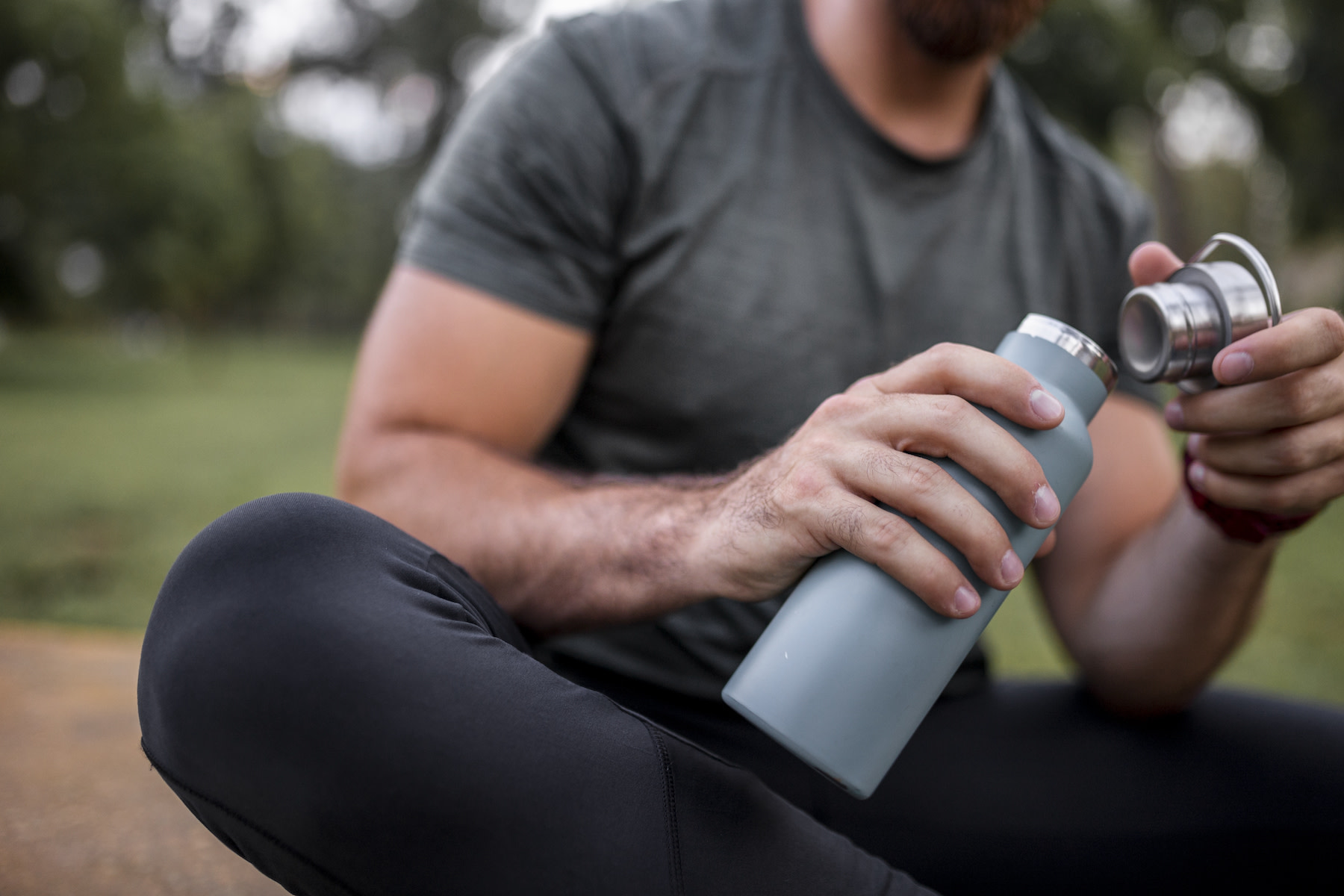
Nastasic / E+ via Getty Images
Should You Actually Be Drinking a Gallon of Water a Day?
Refreshing your hydration goals? Here’s how to do it safely.
By Ayren Jackson-Cannady•
Why It’s Important to Stay Hydrated
Should You Drink a Gallon of Water a Day?
Is It Ever Dangerous to Drink a Gallon of Water a Day?
General Water Intake Recommendations
11 Benefits of Drinking Enough Water Each Day
The Takeaway
It used to be that if you wanted to drink a gallon of water a day, you’d have to rinse out an old milk jug and reuse it. Nowadays, you can buy an actual gallon-size water bottle that looks aesthetically pleasing and supports an all-day hydration goal.
This water bottle glow-up may be partially fueled by the many videos on social media of people showcasing their daily hydration habits. On TikTok, for example, #gallonofwateraday has 41 million views and counting at the time of publication. Aside from social media, the concept of drinking a gallon of water a day has been particularly popular within the bodybuilding community. This hydration trend isn’t necessarily a bad thing, as drinking enough water is crucial for keeping your body and mind functioning at its best. But the amount of H2O you should drink every day is also personal.
So, should you really aim to drink a gallon of water every day? We turned to nutrition experts for answers. Here’s everything you need to know.
Why It’s Important to Stay Hydrated
The significance of staying hydrated cannot be overstated. Water helps keep your body temperature just right, moves waste out of your body, and even ensures your joints and organs work smoothly, as the Mayo Clinic notes. And of course, you literally need water to survive.
“The big problem we see is that people don’t drink enough water, and you desperately need hydration,” says Rachel Trotta, a NASM-certified personal trainer with a specialization in nutrition based in Red Bank, New Jersey. “Dehydration can affect you in many ways, making you feel tired, stressed, unproductive, or even hungry.”
Should You Drink a Gallon of Water a Day?
You don’t necessarily need to drink a gallon of water every day. The gallon benchmark is not a one-size-fits-all rule, and individual hydration needs can vary based on things like your age, body size, activity level, and where you live. So while the idea of drinking a gallon of water daily has been popularized as a general hydration guideline, it may not be necessary or suitable for everyone.
“Giving a hard goal of a gallon of water a day can help people aim high, and it has the advantage of being a concrete measurement that people recognize and can measure,” Trotta says. “But since many people don’t need [that many] ounces of water, an easier (and more practical) strategy is to carry a reusable water bottle and to connect drinking water to certain routines [like working out or driving in your car].”
More important than stacking up cups of water is listening to your body's signals of thirst—like dry mouth, headaches, and muscle cramps. Those little clues are your brain’s way of telling you that you’re dehydrated and not drinking enough water, Trotta says.
Is It Ever Dangerous to Drink a Gallon of Water a Day?
Drinking a gallon of water a day is usually safe for most, but drinking too much water can be risky for those with certain health conditions like kidney disorders or heart problems, says Ellen Landes, RDN, CPT, a registered dietician based in St. Charles, Illinois, and owner of The Runner's Dietitian.
In general, while hydration is key, you don't want to overdo it and drink too much water in a short period, notes the Cleveland Clinic. While it’s rare, overhydrating can come with some negative health effects, including hyponatremia (aka extremely low sodium levels), electrolyte imbalance, digestive issues, increased blood pressure, and more.
On a practical level, you can avoid many of these issues by “drinking water gradually rather than chugging it, by responding to thirst instead of pushing yourself into a discomfort zone for an arbitrary water intake goal, and by using electrolyte replacement (especially sodium) for long-distance exercise,” Trotta says.
General Water Intake Recommendations
So, how much water should you be drinking each day? There’s not one definitive answer to this question, as hydration needs vary from person to person. But there are a few common guidelines to get you started:
According to the U.S. National Academies of Sciences, Engineering, and Medicine, an adequate daily water intake is about 3.7 liters for men (roughly a gallon) and about 2.7 liters for women (about seven-tenths of a gallon).
Another general rule of thumb is to drink “half your body weight in ounces” for a regular day. In real-life terms, that means that if you weigh 150 pounds, you should aim to drink at least 75 fluid ounces of water per day.
You might also be familiar with the traditional recommendation to consume eight 8-ounce glasses of water a day, which equates to almost 2 liters, or half a gallon, of H2O. While well-intended, this advice reportedly stems from a recommendation that’s half a century old and doesn’t account for things like activity levels.
With all these different guidelines, what do experts advise? “In general, women need 2.2 liters of fluid and men need 3 liters of fluid per day,” Landes says. “If you're exercising, especially in heat or for long durations, this number should increase. It’s helpful to know your individual sweat rate in different types of exercise and environments so you know how to properly replace those fluids.”
For a lot of active people, drinking to quench thirst won’t be enough to prevent dehydration, especially during longer or heavy sweating sessions. To determine how much fluid you need with exercise, Landes says to try a sweat test by weighing yourself naked before working out and again afterward, if you feel comfortable doing so. “The pounds lost are correlated with the amount of fluids lost through sweat,” she says. “You should aim to drink back 16–20 ounces of fluid per pound lost.”
In general, if you (understandably) find it tricky to track your exact water intake, a practical way to stay on top of your hydration status day to day is by checking the color of your urine, Landes says. Aim for pale to light yellow, which is a good indicator that you're well-hydrated. Darker urine signals a need for more fluids.
What Factors Impact Your Water Intake?
No matter how many different daily water intake recommendations there are, the amount that’s right for you can change depending on personal factors. Here are a few considerations that can play into your unique water intake:
Age: Children and teens typically have different hydration needs than adults.
Pregnancy and breastfeeding: People who are pregnant or breastfeeding may require higher water intake to support their additional fluid needs.
Body weight: People living in larger bodies may require more water than those living in smaller ones.
Activity level: Athletes and individuals engaging in strenuous physical activity may need more water to compensate for fluid loss through sweat.
Climate: Hot and humid climates may increase the need for water to prevent dehydration.
Health conditions: Certain medical conditions, such as kidney problems or diabetes, may affect fluid balance and influence water requirements.
As always, listen to your body and talk to your health practitioner if you have any questions about the right water intake for you.
What About Water from Foods and Other Beverages?
The good news is you don’t have to rely entirely on your liquid intake to remain well-hydrated. Foods with high water content, like fruits, veggies, soups, and smoothies, are extremely hydrating on a day-to-day basis. “Even beverages that we think of as dehydrating, like tea or coffee or hot cocoa, can help with hydration,” Trotta says. That said, Landes notes it’s tricky to estimate the amount of water you get from your food, so know that it’s not an exact science.
With all that in mind, here are some water-rich foods to consider adding to your plate, according to the US Department of Agriculture (USDA):
Cucumber: About 96 percent water content
Lettuce (iceberg): About 96 percent water content
Celery: About 95 percent water content
Watermelon: About 92 percent water content
Strawberries: About 91 percent water content
Cantaloupe: About 90 percent water content
Broccoli: About 89 percent water content
Oranges: About 87 percent water content
Yogurt (plain, non-fat): About 87 percent water content
Chicken breast (cooked): About 65 percent water content

Eleganza / E+ via Getty Images
11 Benefits of Drinking Enough Water Each Day
Whether it’s a gallon of water each day or another intake that works best for your body, there’s no denying that staying hydrated is crucial for health and exercise performance. Here are some benefits of staying sufficiently hydrated every day:
Cell hydration: Water is a fundamental component of cells, tissues, and organs, contributing to their proper structure and function.
Temperature regulation: Adequate water intake helps regulate body temperature through processes such as sweating.
Nutrient transport: Water facilitates the transport of nutrients throughout the body, promoting optimal metabolic function.
Joint lubrication: Water helps lubricate joints, reducing friction and supporting smooth movement during workouts.
Digestive health: Sufficient water intake aids in digestion, helping break down food and promoting the absorption of nutrients in the digestive system.
Detoxification: Water plays a role in flushing out waste products and toxins from the body through urine, supporting kidney function.
Cognitive function: Proper hydration is linked to improved cognitive performance, concentration, and mental alertness.
Weight management: Drinking water before meals can contribute to a feeling of fullness, potentially reducing overall calorie intake and supporting weight management, if that’s a goal for you.
Energy levels: Dehydration can lead to fatigue and decreased energy levels, while adequate water intake helps maintain physical and mental stamina.
Mood regulation: Hydration is associated with improved mood and may help alleviate symptoms of dehydration-related irritability or headaches.
Exercise aid: “Proper hydration also plays a role in physical performance and recovery—even mild dehydration can impair endurance, reduce strength, cause fatigue, and make exercises feel extra challenging (not in a good way),” Landes says.
The Takeaway
Staying hydrated is essential for overall health, but the notion of drinking a gallon of water daily has become a popular (albeit question-inducing) trend. While a gallon of water a day may be appropriate for some, it might not be necessary or even suitable for everyone. The amount of water you drink every day depends on personal factors like your age, body weight, and activity level, but making sure you drink the proper amount of H2O for you is key to your health and well-being. As always, talk with your doctor or a registered dietitian if you have any questions about your hydration habits.

Peloton App
Access thousands of classes with no equipment needed.
This content is for informational and educational purposes only and does not constitute individualized advice. It is not intended to replace professional medical evaluation, diagnosis, or treatment. Seek the advice of your physician for questions you may have regarding your health or a medical condition. If you are having a medical emergency, call your physician or 911 immediately.
This content is for informational and educational purposes only and does not constitute individualized advice. It is not intended to replace professional medical evaluation, diagnosis, or treatment. Seek the advice of your physician for questions you may have regarding your health or a medical condition. If you are having a medical emergency, call your physician or 911 immediately.
Level up your inbox.
Subscribe for a weekly dose of fitness, plus the latest promos, launches, and events.
By providing your email address, you agree to receive marketing communications from Peloton.
For more about how we use your information, see our Privacy Policy.





